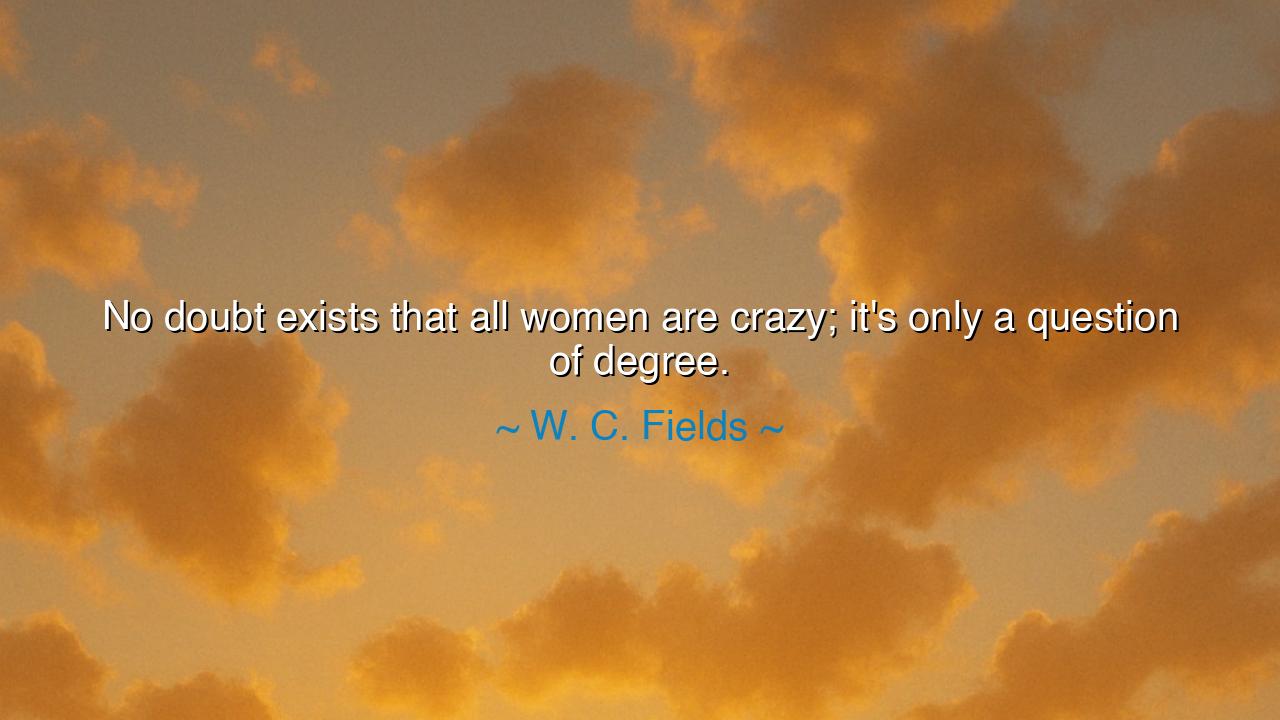
No doubt exists that all women are crazy; it's only a question






Hear the jesting words of W. C. Fields, the comic of a bygone age: “No doubt exists that all women are crazy; it’s only a question of degree.” At first glance, these words seem but a laugh, a playful barb cast into the air of humor. Yet as with many such sayings, behind the veil of jest lies a mirror reflecting deeper truths of human nature. Fields, master of irony and exaggeration, used the word crazy not as condemnation, but as a way to describe the passion, unpredictability, and fierce vitality that women often bring into the lives of men.
The origin of this saying rests in the comedic stage and screen of the early 20th century. Fields, a man known for his sharp tongue and exaggerated portrayals, often spoke in paradoxes meant to both amuse and provoke thought. In declaring all women “crazy,” he was not speaking of madness in the cruel sense, but of that fire of spirit which refuses to be confined by rigid logic. His jest was an acknowledgment of the mystery, the unpredictability, and the strength that women carry, qualities that often bewilder men who seek a more predictable order.
History itself provides us with examples that give depth to his humor. Consider Catherine the Great of Russia. To her enemies, her boldness and her relentless drive seemed crazy; how could a woman wield such vision and authority in a world ruled by men? Yet her so-called madness was genius, transforming Russia into a modern empire. What men mocked as unpredictability was in truth a brilliance of spirit, a refusal to bow to the narrow limits imposed upon her. Thus we see: what is called “crazy” is often simply power misunderstood.
The deeper meaning of Fields’ words, though wrapped in jest, lies in this truth: passion is often mistaken for irrationality. That which burns brightly, that which loves fiercely, that which refuses to be tamed, is called wild or “mad” by those who cannot comprehend it. But such “madness” is the very essence of life’s beauty. For what is love without a touch of risk? What is greatness without daring? To live always in strict reason is to live half-dead; to embrace a measure of unpredictability is to be fully alive.
The lesson for us is clear: do not despise what seems “crazy” in others, especially in women whose strength and emotion defy convention. Instead, recognize it as vitality, as a force that gives color and shape to the world. Every degree of this so-called madness is in truth a degree of passion—whether for love, for justice, for family, or for dreams. To silence it is to silence the very heartbeat of life.
To the youth, I say: do not be afraid of being called “crazy” when your heart burns with vision. To the men, I say: do not mock the passion of women, but honor it, for it often carries wisdom beyond the reach of reason. To the women, I say: never be ashamed of your fire. If they call you mad, remember that many of the world’s greatest souls bore the same label.
Practical action lies before us: embrace passion in yourself and others. When someone acts with emotion, do not dismiss them as irrational—ask what truth their fire is revealing. Cultivate balance, yes, but never at the cost of silencing vitality. Encourage boldness, creativity, and conviction, even when they seem strange. For in such things, humanity moves forward.
Thus the jest of W. C. Fields, though born in laughter, may be received as wisdom: that the “craziness” of women, far from being a flaw, is a mark of their unyielding vitality. It is not madness but mystery, not weakness but power. Let us not fear it, but embrace it, for it is this very flame—sometimes wild, sometimes tender—that gives life its depth, its color, and its triumph.






TDNgo Van Tan Dat
Although W. C. Fields’ quote may have been meant as a joke, it underscores how harmful stereotypes about women’s emotional states have been woven into cultural narratives. How does such humor contribute to the normalization of harmful expectations placed on women to act or behave in a certain way? Shouldn’t we hold such ideas accountable rather than laughing them off as harmless jokes?
KKKim Khanh
This quote by W. C. Fields reflects a dated view that undermines women’s emotional and intellectual depth. Is it possible that such humor, while intended as a joke, actually perpetuates a culture of gender inequality? How does humor based on stereotypes affect our understanding of gender dynamics? Is there room for comedy that challenges these outdated notions instead of reinforcing them?
ATLe Anh Tu
W. C. Fields’ quote feels like it reflects the gender biases that were prevalent at the time. But is this quote an example of how such biases are still normalized in contemporary conversations, often under the guise of humor? How do these kinds of stereotypes influence the way society perceives women’s emotions and actions? Can we move past these generalizations and start acknowledging the vast diversity of experiences women have?
TDNguyen Thi Duyen
This quote is an example of humor that relies on negative stereotypes about women. It’s important to question the impact of such remarks, even if they’re made in jest. Could we not shift the conversation towards celebrating the complexity and diversity of women’s experiences, rather than reducing them to simplistic and disparaging generalizations? How can we foster more respectful and empowering conversations about women in public discourse?
DNdat nguyen
While W. C. Fields might have intended this quote as humor or satire, it raises an important question about how women have been historically portrayed. Why do we still laugh at jokes that generalize or demean women? How does this kind of humor shape public perceptions of gender and contribute to the perpetuation of harmful stereotypes about women’s behavior and emotional states?